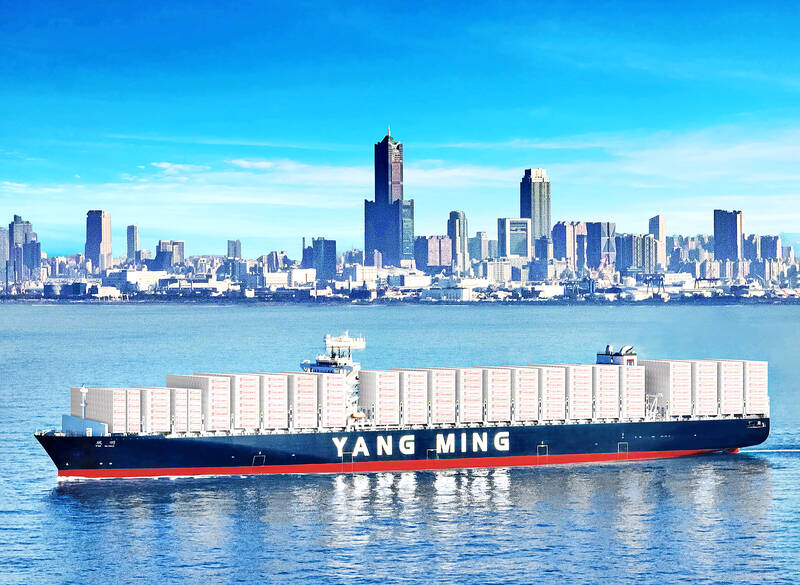Uncertainties remain for the global shipping market next quarter, even though freight rates on the main east-west routes have stopped declining this quarter, Yang Ming Marine Transport Corp (陽明海運) told an online investors’ conference yesterday.
“The global market is still affected by high inflation, overcapacity and interest rate hikes, while the issue of supply-demand imbalance remains,” Yang Ming Marine Transport said in a document released after the conference.
Citing forecasts made last month by maritime research consultancies Drewry, Alphaliner and Clarksons, it said that “supply will exceed demand from this year to next year.”

Photo courtesy of Yang Ming Marine Transport Corp
Other challenges included China’s weak export performance, and the US and European markets entering their slow season next quarter, said the company, which is the nation’s second-largest container shipper by fleet size.
A count this month showed that Yang Ming Marine Transport has 93 vessels in its fleet with a combined capacity of 705,614 twenty-foot equivalent units (TEUs), making it the world’s ninth-largest container shipper.
Shipping companies had a windfall in the past two years thanks to a surge in demand for consumer goods and freight rates during the COVID-19 pandemic, but demand has waned this year, leading to a slump in global shipping.
Yang Ming Marine Transport reported cumulative revenue of NT$95.69 billion (US$2.99 billion) in the first eight months of this year, down 66.77 percent from the same period last year.
Net profit in the first half plunged to NT$3.27 billion from NT$116.11 billion in the first half of last year, company data showed.
Earnings per share were NT$0.94 in the first half, compared with NT$33.25 a year earlier, the data showed.
While cargo volume has increased this quarter compared with the first half, European and American routes are not as robust as in previous peak quarters, which the company attributed to a slowing global economy and the still-weak recovery in demand.
Consumption during holiday shopping seasons in Europe and the US is key to the industry, Yang Ming Marine Transport said, adding that strong sales over Thanksgiving in the US and Christmas would help reduce inventory and might lead to a rebound in cargo volumes.
Yang Ming Marine Transport said that it does not have a clear picture about its business prospects for next year.
Although some other shippers are to receive new vessels next year, Yang Ming Marine Transport said its shipping capacity and route deployment would not change much next year, adding that it plans to acquire new vessels in 2026.

Nissan Motor Co has agreed to sell its global headquarters in Yokohama for ¥97 billion (US$630 million) to a group sponsored by Taiwanese autoparts maker Minth Group (敏實集團), as the struggling automaker seeks to shore up its financial position. The acquisition is led by a special purchase company managed by KJR Management Ltd, a Japanese real-estate unit of private equity giant KKR & Co, people familiar with the matter said. KJR said it would act as asset manager together with Mizuho Real Estate Management Co. Nissan is undergoing a broad cost-cutting campaign by eliminating jobs and shuttering plants as it grapples

TEMPORARY TRUCE: China has made concessions to ease rare earth trade controls, among others, while Washington holds fire on a 100% tariff on all Chinese goods China is effectively suspending implementation of additional export controls on rare earth metals and terminating investigations targeting US companies in the semiconductor supply chain, the White House announced. The White House on Saturday issued a fact sheet outlining some details of the trade pact agreed to earlier in the week by US President Donald Trump and Chinese President Xi Jinping (習近平) that aimed to ease tensions between the world’s two largest economies. Under the deal, China is to issue general licenses valid for exports of rare earths, gallium, germanium, antimony and graphite “for the benefit of US end users and their suppliers

Dutch chipmaker Nexperia BV’s China unit yesterday said that it had established sufficient inventories of finished goods and works-in-progress, and that its supply chain remained secure and stable after its parent halted wafer supplies. The Dutch company suspended supplies of wafers to its Chinese assembly plant a week ago, calling it “a direct consequence of the local management’s recent failure to comply with the agreed contractual payment terms,” Reuters reported on Friday last week. Its China unit called Nexperia’s suspension “unilateral” and “extremely irresponsible,” adding that the Dutch parent’s claim about contractual payment was “misleading and highly deceptive,” according to a statement

The Chinese government has issued guidance requiring new data center projects that have received any state funds to only use domestically made artificial intelligence (AI) chips, two sources familiar with the matter told Reuters. In recent weeks, Chinese regulatory authorities have ordered such data centers that are less than 30 percent complete to remove all installed foreign chips, or cancel plans to purchase them, while projects in a more advanced stage would be decided on a case-by-case basis, the sources said. The move could represent one of China’s most aggressive steps yet to eliminate foreign technology from its critical infrastructure amid a